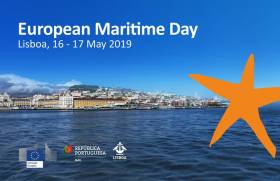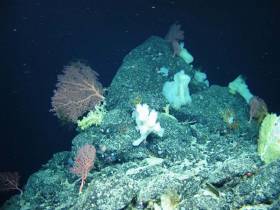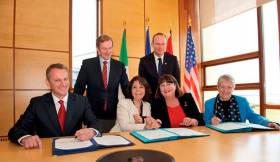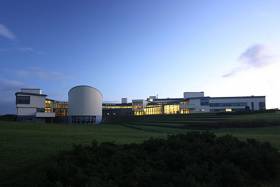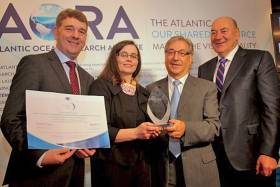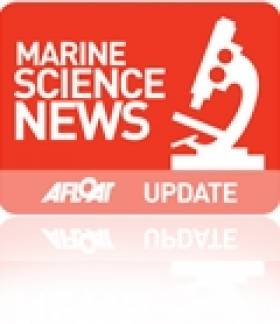Displaying items by tag: Galway Statement
Chief executive Dr Peter Heffernan is representing the Marine Institute at European Maritime Day 2019 in Lisbon, Portugal this week.
Concluding today, Friday 17 May, European Maritime Day is one of the largest marine science and policy meetings of the year.
The 2019 programme focuses on blue entrepreneurship, research, innovation and investment to transform traditional maritime sectors and boost emerging technologies.
Dr Heffernan said the Marine Institute “plays a crucial role in supporting, co-ordinating and promoting marine research at a national and international level.
“By working alongside academic institutions in Ireland, and participating in and leading research partnerships, the institute is able to increase our knowledge of the ocean which will assist in the sustainable management and development of our marine resource.”
The Galway Statement, signed at the Marine Institute in 2013, provided the first step in forming the Atlantic Ocean Research Alliance (AORA) between the European Union, Canada and the United States of America.
AORA aims to promote a healthier Atlantic Ocean, find more sustainable ways to use its resources and increase people’s awareness and literacy surrounding the ocean.
“AORA is science diplomacy at work,” Dr Heffernan said. “Transatlantic cooperation has been instrumental to the success of AORA and creating a strong Atlantic community.
“Within five years, scientific research teams working together in the Atlantic have unearthed new discoveries and knowledge in the areas of seabed mapping, ocean observation, climate and polar research, and marine biotechnology.”
European Maritime Day encourages a ‘blue economy revolution’ to deliver economic growth in the maritime sector and expand employment opportunity.
The programme covers almost all aspects of marine science, technology and policy, and encourages participants to engage with partners from the EU community to exchange information.
The 2020 European Maritime Day annual meeting will be hosted by Cork City Council, which will mark the first time Ireland has hosted the event.
#MarineScience - A multinational team of ocean exploration experts returned to Galway on World Ocean Day (Friday 8 June) after spending the last few weeks exploring and mapping the Charlie-Gibbs Fracture Zone of the Mid-Atlantic Ridge.
Using the robotic mini-sub ROV Holland I, the TOSCA (Tectonic Spreading and the Charlie-Gibbs Fracture Zone) research team led by Dr Aggie Georgiopoulou of UCD collected “spectacular” film footage of sponge gardens.
In another first for deep-sea exploration, the marine science team on board the RV Celtic Explorer also found more than 70 skate eggs in a nursery some 2,000 metres below the surface.
“Up to 150 rock and sediment samples amounting to roughly 200kg along with 86 hours of video footage and over 10,000 square kilometres of the zone were also mapped, which is almost the size of Co Galway and Co Mayo together,” Dr Georgiopoulou said.
The Charlie-Gibbs Fracture Zone was mapped for the first time in 2015 on the RV Celtic Explorer as one of the key projects launched by the Atlantic Ocean Research Alliance, following the signing of the Galway Statement on Atlantic Ocean Cooperation between Canada, the EU and the US in May 2013.
“The high resolution data produced by Ireland’s INFOMAR programme in 2015, that revealed spectacular landscape with 4,000m-high mounds rising from the seabed to 600m below the sea surface — taller than Carrauntoohil, Ireland’s highest mountain — has been instrumental in our continued research over the last month,” Dr Georgiopoulou said.
The tectonic spreading at the Charlie-Gibbs Fracture Zone consists of two huge parallel cracks in the crust of the Atlantic Ocean running between Ireland and Newfoundland, and is the longest-lived fracture zone in the Atlantic. It is the most prominent feature interrupting and offsetting the Mid-Atlantic Ridge.
“What we have found at the Charlie-Gibbs Fracture Zone surpassed all of our expectations,” Dr Georgiopoulou added. “Exploring three mountain areas, 500-1,000m-high scarps were discovered that have been produced by catastrophic rock avalanches, with giant boulder fields spilling into the fractures.
“Although these fracture zones are similar to the San Andreas fault in the western US and the North Anatolian fault in Turkey and Greece, with large earthquakes taking place there regularly, this is the first time there has been a dedicated geological study in the Charlie-Gibbs Fracture Zone area.”
The TOSCA expedition involved 13 scientists from nine institutions and five different countries including Ireland, the UK, Germany, Canada and Greece.
Experts in seabed mapping, marine geology, oceanography and marine biology, each team will return to their respective Institutes to analyse all the data and work out how the mountains were formed, when and how the rock avalanches take place and how the geology affects the local habitat for marine wildlife.
Marine Institute chief executive Dr Peter Heffernan congratulated the team on their recent discoveries, stating that deep ocean expeditions cannot be taken for granted as we need to better understand the features that make up the ocean seabed.
“With the ocean affecting climate change, global population and seafood demand, we need to map our seabed to define favourable habitats for fishing, key sites for conservation, and safe navigation for shipping.
“The expedition supported by AORA also reflects the value and essential role of international partnerships, particularly with achieving the shared goals of the Galway Statement on Atlantic Ocean Cooperation 2013, which include our ongoing cooperation on ocean science and observation in the Atlantic Ocean,” Dr Heffernan said.
#MarineScience - Five years ago this month, the Galway Statement on Atlantic Ocean Cooperation was signed and the Atlantic Ocean Research Alliance (AORA) between the European Union, Canada and the United States of America formed.
In the time since, the AORA has already been recognised as a success story in the Atlantic area, highlighting international best practices, and promoting the key priorities of the European Union’s Atlantic Strategy and Atlantic Action Plan, embodied in the Galway Statement and its potential support to the Blue Economy.
Today there are more than 500 research teams working in the Atlantic Ocean. Transatlantic co-operation has been embedded and embraced at the heart of the scientific teams working together in Atlantic-wide field campaigns on seabed mapping, ocean observation, seafood, weather, climate and polar research, marine biotechnology and marine spatial planning.
The Galway Statement has also provided the first step in all-Atlantic co-operation, leading to the signing of the Belém Statement on Atlantic Research & Innovation Cooperation between the European Union, South Africa and Brazil. An all-Atlantic research community is also being built.
New transatlantic institutional structures have been formed, including an Ocean Frontier Institute in Canada which includes European and US partners.
Speaking about the achievements to date, Dr Margaret Rae, director of AORA co-ordination and support action at the Marine Institute, said: “AORA is using the latest technology to map the Atlantic, making groundbreaking discoveries like previously uncharted undersea volcanoes and mountains, circulation patterns, and more.
“Our coordinated efforts are helping to create a blueprint for the next generation of ocean observation. And there’s still much to uncover, from new sources of energy and food to lifesaving medicines found in unexpected sources.
“By learning all we can about our oceans, we can create a world with better navigation, weather prediction, smarter search and rescue, health, and a thriving seafood industry that will feed generations to come.”
Transatlantic research teams with Horizon 2020 funding have unearthed new discoveries and knowledge:
Seabed Mapping
- Completed seven opportunistic transatlantic surveys by Irish, Canadian, French and Fugro vessels, resulting in discoveries of uncharted seamounts kilometres high, deep sea volcanoes, and ridges some hundreds of kilometres in length.
- Developed a collaborative model for industry, research and government to promote Atlantic seabed mapping and open data.
- Encouraged private sector participation for public good, resulting in Fugro contributing more than 65,000 sq km of high resolution data. Fugro maps the seabed while transiting between offshore projects.
Ocean Observation
- Completed an analysis of Atlantic-wide observation system capacities/gaps.
- For the first time a team has formed to develop a blueprint for an Atlantic-wide integrated ocean observing system with wide Atlantic participation.
Atlantic Ecosystems
- Co-ordinated expeditions to map deep-sea Atlantic ecosystems and advanced knowledge of key species, ecosystems and processes.
- Discovered modern Atlantic Ocean circulation which is atypical of the longer term.
- Deployed new sensors in eastern subpolar North Atlantic to enable key advancements in understanding of ocean physics interactions.
- Provided scientific evidence that temperature change, acidification, fisheries and their cumulative effects pose the greatest risks to ecosystem services.
- Successfully tested a generic Marine Spatial Planning (MSP) framework to assess spatially managed areas (SMAs) across the North Atlantic.
Seafood
- For the first time, climate vulnerability assessments of North Atlantic fish and shellfish, including the human communities dependent on these have been rigorously compared across the EU, US & Canada – strengthening scientific cooperation and building better forecasts.
- Made the first steps to use marine algae to build ‘blue belts’ for carbon/nitrogen sequestration and sustainable aquaculture.
Ocean Education
- Developed a transatlantic ocean literacy strategy and a range of new ocean educational materials (videos, teaching modules, infographics).
Weather, Climate & Polar Research
- Worked together to study Arctic warming impacts, ecosystem productivity and ocean-climate dynamics to give new understanding to local populations.
- Facilitated co-operative understanding of the impact of a changing Arctic on weather and climate across the northern hemisphere.
- Worked with public and private users of climate information to help them incorporate uncertain scientific evidence into real-world decision-making processes.
For more information see www.atlanticresource.org.
Canada’s Environment & Climate Change Minister Visits Marine Institute To Talk Atlantic Ocean Collaboration
#MarineScience - Canada’s Minister of Environment and Climate Change, Catherine McKenna, was at the Marine Institute headquarters in Oranmore yesterday (Friday 13 October) to discuss collaborations under the Atlantic Ocean Research Alliance.
The Marine Institute meetings were part of a tour by Minister McKenna to London and Dublin to advance discussions on clean growth and climate action.
Minister McKenna was accompanied by Canadian Ambassador to Ireland Kevin Vickers and met with the Marine Institute’s chair Dr John Killen and chief executive Dr Peter Heffernan, members of the senior management team and scientific staff.
The meeting provided an opportunity to discuss existing projects and opportunities to further Ireland and Canada’s collaboration on Atlantic Ocean research and climate impacts.
“Transatlantic cooperation is essential to broadening our scientific understanding of the Atlantic Ocean and helping to ensure it remains healthy and productive,” said Dr Heffernan. “It’s hugely important for Ireland and brings us closer to achieving the goals of the Galway Statement on Atlantic Ocean Co-operation signed here at the Marine Institute Galway in May 2013 by the EU, USA and Canada.
“The goal is to work together, share expertise and advance our science goals to promote the sustainable management of our Atlantic ocean for the benefit of all.”
Since the signing of the Galway Statement, the Marine Institute says it has led initiatives to further this collaboration in areas including Atlantic seabed mapping and climate change research, and is leading the EU H2020-funded Atlantic Ocean Research Alliance - Coordination and Support Action.
Speaking on her visit to the Marine Institute, Minister McKenna said: “Canada and Ireland are natural partners on marine research. Canada recognises that Atlantic research will be more effective if we work together and on both sides of the ocean.
“The knowledge we gain benefits us all, and all and is crucial to helping us to meet the challenges we face, in particular climate change, food security and new sources of energy.”
Ambassador Vickers added: “We are now entering a new era of transatlantic co-operation that will enable us to achieve great things together in the coming years.
“We are raising the importance for ocean discovery above sectoral interests and putting marine research on a new global level that transcends national borders, making literal the bonds connecting Ireland and Canada, to increase our knowledge of the ocean that joins us and to maximise the innovation potential it affords us.”
Atlantic Ocean Research Alliance Project Wins International Award
#MarineScience - The Atlantic Ocean Research Alliance Co-ordination and Support Action (AORA-CSA) has received the first Atlantic Project Award for International Cooperation.
The Marine Institute-led project was presented with the accolade yesterday (Tuesday 27 September) during the Atlantic Stakeholders Conference at the Croke Park Conference Centre.
Karmenu Vella, European Commissioner for Environment, Maritime Affairs and Fisheries, presented the award to Dr Peter Heffernan and Dr Margaret Rae of the Marine Institute, the lead partner in the Horizon 2020-funded project to implement the Galway Statement on Atlantic Ocean co-operation and support the emerging blue economy.
Marine Minister Michael Creed highlighted the importance of the Atlantic Strategy to Ireland in his address to the conference, which aims to promote entrepreneurship and innovation as a hub for participants to make valuable contacts and explore areas for co-operation, share information and good practices, promote and identify new ideas as well as funding opportunities and partnerships for their projects.
"Just over half of the 400-plus delegates at the conference today are Irish, many of them SMEs, which shows the importance of the Atlantic Strategy to Ireland and the significant opportunities it represents,” said Dr Heffernan, the Marine Institute’s chief executive.
“Irish SMEs have the chance to meet face to face with potential research partners and investors, and to work together on ideas for novel marine projects at the networking and matchmaking activities here today.”
The Atlantic Strategy has influence on the European Union’s innovation and funding programmes, including the Horizon 2020 framework programme for research, the European Maritime and Fisheries Fund (EMFF) and the InterReg programme.
"Irish marine researchers have been very successful in winning blue growth research funding, with 5% of the available budget under Horizon 2020 in 2014 going to Irish researchers,” said Dr Heffernan. “Irish marine research projects benefitted from €5.6m funding and resulted in the creation of about 41 research jobs.
"Irish researchers had an equally strong performance in 2015, winning €2.86m in competitive funding, representing 4.7% of the total EU budget in this area."
Seven Irish research organisations were funded under the 2015 calls, with NUI Galway winning nearly €1m for a number of marine research projects.
Another notable Irish success was Brandon Bioscience Ltd, funded under the SME instrument as partners in the SEA MORE YIELD project to commercialise a novel biotech solution to yield losses in oil seed crops using native Irish seaweed.
The Atlantic Strategy Group, which oversees the implementation of the EU's Atlantic Strategy, is currently chaired by Ireland and made up of relevant member states (Ireland, UK, France, Portugal, and Spain), the European Parliament and the European Commission, as well as regional representatives.
#BlueGrowth - The first projects funded under the EU's Horizon 2020 programme for 'blue growth' will be launched at a conference in Brussels next month.
The Atlantic - Our Shared Resource: Making the Vision Reality will be held at the Palais d'Egmont from 16-17 April.
It marks a "new exciting stage" in implementation of activities signposted in 2013's Galway Statement on Atlantic Ocean Co-operation.
And it's sure to inform the discussions at this July's Harnessing Our Ocean Wealth Conference in Cork Harbour.
Details on registration for the conference are available HERE.
Scientists Discuss 'Unknown Treasure' Of The Atlantic Ocean
#MarineScience - The Atlantic Ocean: Our Unknown Treasure was on the agenda at the annual meeting of the American Association for the Advancement of Science (AAAS) in San Jose, California on Saturday 14 February.
Marine Institute chief executive Dr Peter Heffernan joined European Commission officials and leading scientists from the USA, Europe and Canada to discuss how to explore the largely unknown Atlantic Ocean; how new technologies can help us to challenge our understanding of the planet; and how new observation and visualisation tools can improve what we know about the seabed and inform science to help shape future marine policy.
The event built on the Galway Statement on Atlantic Ocean Research Co-operation signed at the Marine Institute in May 2013 by representatives from the EU, Canada and the US, launching an Atlantic Ocean Research Alliance.
Its goals are to better understand the Atlantic and the Arctic, to study the interplay between them, particularly relating to climate change, and to promote sustainable management of their resources.
Speaking about the event, Dr Heffernan said: "It's an exciting time, as all sides - European, US and Canadian - have shown engagement, planning and commitment to driving the Atlantic Ocean Research Alliance forward and preparing joint actions.
"There are very real global challenges to be tackled, and there is strong momentum now to create significant benefits such as better ecosystem assessments and forecasts and deeper understandings of vulnerabilities and risks.
"These transatlantic collaborations will also help to generate new tools to increase resilience and adaptation and to conserve our rich biodiversity. We also really need to foster public understanding of how ocean science and observation will address pressing issues for citizens and for the environment."
Dr Heffernan concluded: "The AAAS meeting gave an opportunity to see some of the collaborations that are undertaken in the Atlantic Ocean and discuss challenges for future research, technological developments, mapping and imaging as well as research co-operation across the Atlantic."



























